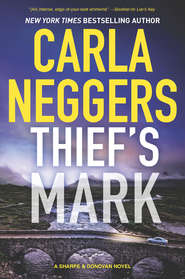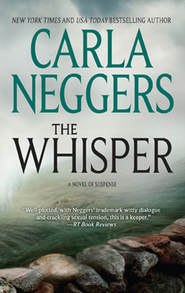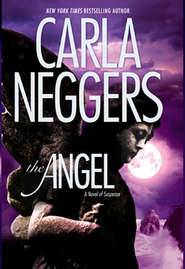По всем вопросам обращайтесь на: info@litportal.ru
(©) 2003-2024.
✖
Wisconsin Wedding
Настройки чтения
Размер шрифта
Высота строк
Поля
“Just fine, Mrs. Atkins. Here, let me take that for you.”
Off to their left, Martha Bauer and Inger Hansen continued their discussion of the Body at the Lake. “Now, you can think me catty,” Inger said, “but I, for one, have always wondered what Judson Ingalls knew about his wife’s disappearance. I’m not accusing him of anything untoward, of course, but I do think—and have thought for forty years—that it’s strange he’s hardly lifted a finger to find her in all this time. He could certainly afford to hire a dozen private detectives, but he hasn’t.”
“Oh, stop.” Martha snatched up a spool of plain white all-cotton thread in addition to her off-white. “Margaret left him a note saying she was leaving him. Why should he have put himself and Alyssa through the added turmoil of looking for a wife who’d made it plain she wanted nothing more to do with him? No, I think he did the right thing in putting the matter behind him and carrying on with his life. What else could he have done? And in my opinion, that’s not Margaret they found out at the lake.”
Inger tucked a big bag of cotton batting under one arm. “Of course, I don’t like to gossip, but whoever it was, I can’t see Liza Baron and that recluse getting married with this dark cloud hanging over their heads. You’d think they’d wait.”
“Oh, Inger,” Martha said, laughing all of a sudden. “Honestly. Why should Liza put her life on hold? Now, would you look at this lovely gabardine?” Deftly she changed the subject.
Nora took two dollars from Rose Atkins for her fabric scrap. As had been the custom at Gates since it opened its doors seventy years ago, Nora tucked the receipt and Rose’s money into a glass-and-brass tube, which she then tucked into a chute to be pneumatically sucked up to the third floor office. There the head clerk would log the sale and send back the receipt and any change. None of the salesclerks handled any cash, checks or credit cards. The system was remarkablely fast and efficient, contributing an old-fashioned charm to the store that its customers seemed to relish.
“Everybody’s gone to computers these days,” Rose commented. “It’s such a relief to come in here and not have anything beep at me. Have you seen those light wands that read price stickers?” She shuddered; the world had changed a lot in Rose Atkins’s long life. “You’ve no plans to switch to something like that, have you?”
“None at all.”
That much Nora could say with certainty. In her opinion, computers didn’t go with Gates’s original wood-and-glass display cases, its Tiffany ceilings, its sweeping staircases and brass elevators, its gleaming polished tile floors. Tradition and an unrivaled reputation for service were what set Gates apart from malls and discount department stores. As Aunt Ellie had before her, Nora relied on value, quality, convenience and style to compete. At Gates, Tyler’s elderly women could still find a good housedress, its children could buy their Brownie and Cub Scout uniforms, its parents could find sturdy, traditional children’s and baby clothes. The fabric department kept a wide range of calico fabrics for Tyler’s quilting ladies. There was an office-supply department for local businesses, a wide-ranging book section for local readers, a lunch counter for hungry shoppers. Nora prided herself on meeting the changing needs of her community. As far as she was concerned, tradition was not only elusive in a fast-paced world, it was also priceless.
The tube returned, and she slipped out Rose’s change and receipt.
“Have you seen much of Liza Baron since she’s come home?” Rose asked.
“She came in a couple of days ago to fill out her bridal registry,” Nora replied. “But other than that, no.”
Rose’s eyes widened, no doubt at the prospect of wild, rebellious Liza doing anything as expected of her as filling out a bridal registry, but, a discreet woman, she resisted comment.
Behind her, Inger Hansen did no such thing. “I can’t imagine Liza would want to do anything so normal. She’s so much like her grandmother. You don’t remember Margaret Ingalls, Nora, but she was just as wild and unpredictable as Liza Baron. It’s odd, though. Your great-aunt and Margaret managed to get along amazingly well. I have no idea why. They were complete opposites.”
“Ellie was always extremely tolerant of people,” Martha Bauer put in.
“Yes,” Inger said. Even tart-tongued Inger Hansen had respected and admired Ellie Gates.
“I’m sure it’ll be a wonderful wedding,” Nora said, half-wishing she hadn’t delayed her departure to serve the quilters. Liza Baron and Cliff Forrester’s upcoming wedding was indeed the talk of the town, but it was having an effect on Nora that she couldn’t figure out. Was it because Cliff was from Rhode Island?
No. She’d put Byron Sanders out of her mind months and months ago. If the wedding was unsettling her it had to be because of the ongoing mystery of the identity of the body found at Timberlake.
Stella scooted behind Nora. “Here, Miss Gates, let me help these customers.”
Nora backed off, and with Inger Hansen wondering aloud how Liza could have ended up with that “strange man living out at the lake,” ducked out the rear exit.
Even if Liza Baron had been a fly on the wall during the past fifteen minutes, she wouldn’t have cared one whit what the quilting ladies were saying about her and Cliff—she’d marry whenever and whoever she wanted. Liza had a thumb-your-nose-at-the-world quality that Nora appreciated. Nora wondered if she was ever the subject of local gossip. Not likely. Oh, her latest window display always received plenty of attention, and the time she’d added a wheelchair ramp to one of the entrances had gotten people talking about accessibility and such. And folks had talked when, after much soul-searching and calculating how few were sold, she’d ceased to stock men’s overalls. But nobody, she was quite certain, talked about her. Her personal life.
“That’s because it’s dull, dull, dull.”
But wasn’t that exactly what she wanted?
The crisp, clear autumn air lifted her spirits. It was getting dark; the streetlights were already on, casting a pale glow on the bright yellow leaves still clinging to the intrepid maples that lined the perimeter of the parking lot. The feeling that life was passing her by vanished as quickly as it had overtaken her. This was life, at least hers. Small-town Midwest America. So it wasn’t Providence, Rhode Island. So it wasn’t wandering place to place with an elitist East Coast photographer who neither understood her nor the community she cared about. She belonged in Tyler. It was her home, and if it was Byron Sanders’s idea of hell, then so be it.
He was a cretin anyway.
Coincidence or not, Cliff Forrester’s own Rhode Island origins had gotten her thinking about the rake who’d almost ruined her life. For two days running now. She couldn’t make herself stop.
Well, she had to. Rhode Island might be a small state, but the chances of Tyler’s town recluse and a sneaky photographer having any knowledge of each other were remote. And Byron Sanders wasn’t from any “mucky-muck” East Coast family.
He also knew to keep his size elevens out of Tyler, Wisconsin.
But he’d been her one love, and he remained her one secret. No one knew they’d been lovers. Not even Tisha Olsen over at the Hair Affair, who knew everything that went on in Tyler, or the quilting ladies, whose combined knowledge of the town’s social history went all the way back to its founding during the great German immigration to Wisconsin 140 years ago. As far as everyone in Tyler was concerned, Nora was just like her great-aunt, the memorable Ellie Gates.
Only she wasn’t. And she knew it.
So did Byron Sanders.
She was so preoccupied that she arrived at the doorstep of her 1920s house before she even realized she’d come to her tree-lined street. She’d inherited the house from Aunt Ellie. They’d lived together from the death of Nora’s parents in a boating accident on Lake Superior when she was thirteen until Aunt Ellie’s death three years ago, not long after Byron Sanders had moved on. In the house’s quiet rooms and in Aunt Ellie’s quiet life, Nora had found peace and stability and hope.
She’d had the wide clapboards repainted last summer in the same cream color Aunt Ellie had chosen back in 1926. The trim was pure white. It was almost Halloween, but the porch swing was still out, the flower boxes planted with bright yellow mums.
With the house having been shut up all day, Nora left the front door open to catch the afternoon breeze while she went back to the kitchen. It was still thirty minutes before her first student arrived. Time enough for a cup of tea.
She’d made a few changes to the interior of the house, softening some of Aunt Ellie’s relentless formality. She’d covered the furniture in pale neutrals and had added cotton throw rugs, Depression glass, quilted pastel wall hangings. There were two small bedrooms upstairs, one downstairs, a small library, a living room and a dining room that she’d converted into a music room, shoving the gateleg table up against the wall to make room for a new baby grand.
Nora, however, hadn’t changed a thing in the kitchen. Its white cabinets, pale gray-blue walls and yellow accents didn’t need changing so far as she could see. Her friends said she should get a microwave, but she hadn’t yet succumbed. Before she died, Aunt Ellie had purchased a toaster oven. It still worked fine.
After putting on the kettle for tea, Nora sat at the kitchen table and looked out at her darkening yard. The bright leaves of the sugar maple had already fallen to the ground. Lately, birds had taken to fattening themselves at her bird feeders. Soon it would be completely dark. Winter wasn’t far off.
She sighed. She loved autumn; she even loved winter. So why was she hovering on the edge of depression?
She fixed a proper tea: Earl Grey tea leaves, her English porcelain pot, her matching cup and saucer, milk in a tiny milk glass pitcher. A sterling silver spoon. Homemade butter cookies from her favorite bakery. She put everything on a teak tray, which she carried out to the music room.
And nearly dropped it all on the floor.
Moving with the speed and silence of a panther, Cliff Forrester took the tray from her and set it one-handed on the gateleg table. “I didn’t mean to startle you,” he said.
In his five years in Tyler, those were the first words Nora remembered his ever saying to her. She’d bumped into him on occasion at the hardware store, but Liza Baron’s fiancé had made clear he didn’t want to be disturbed at Timberlake Lodge. He wanted to be left alone. To heal his wounds and chase his demons or do whatever it was he did. Nora had heard all the rumors and possibilities. He was a tall, dark man. He didn’t look like…how had Liza put it? Like his family were East Coast mucky-mucks.
“It’s quite all right,” she said, sounding stuffy even to herself. “I was expecting a piano student.”
“You play?”
“Mmm, yes.”
His brow furrowed. “I didn’t know.”
How could he have known? They’d never even officially met until now. “Would you care for a cup of tea? I made more than enough. I always end up having to throw out half the pot.”
He shook his head. “No thanks.”
And then he smiled. Nora found it an unsettling experience, but she couldn’t pinpoint why. She felt no attraction to Liza’s lover. It wasn’t that at all. Then what? Men in general, she thought, disgusted with herself. Tall, dark men from Rhode Island in particular.
Too darned much thinking, she added to herself.











